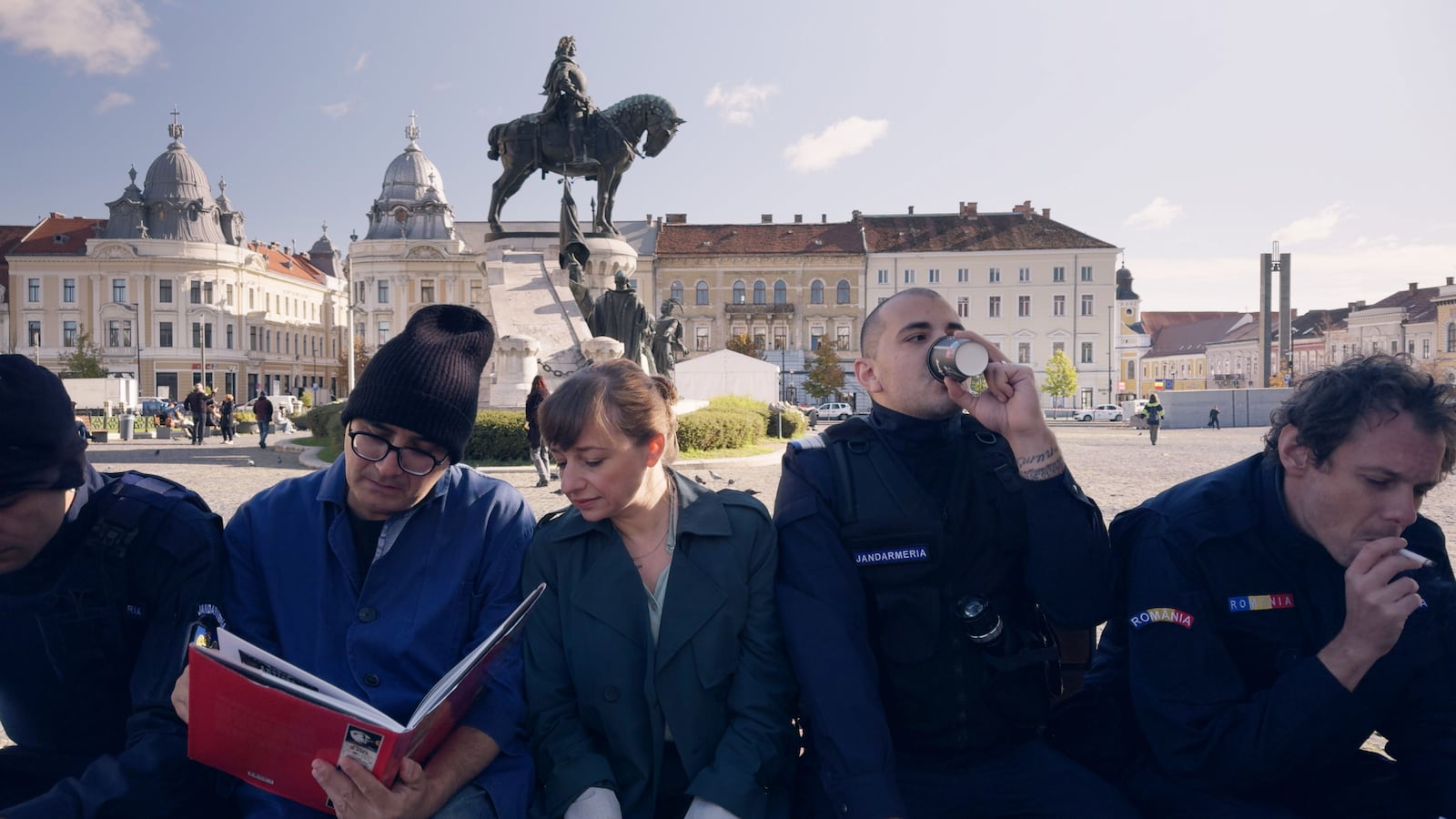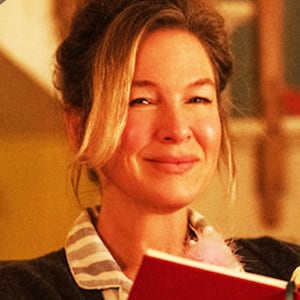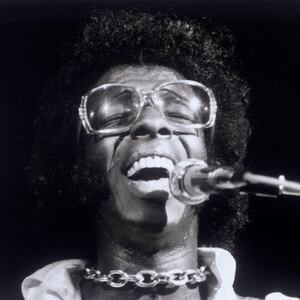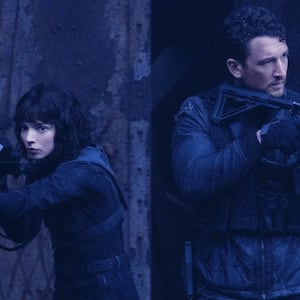Romanian auteur Radu Jude (Do Not Expect Too Much from the End of the World) is a moralist with a satiric, absurdist, and anarchic spirit, and with Kontinental ’25, he continues making movies like no one else.
Riffing on Roberto Rossellini’s Europe ’51 to tell the story of a civil servant’s arduous quest to cope with an incident for which she feels responsible, the director’s latest—premiering on Feb. 19 at the Berlin International Film Festival—is a bracing spiritual and ethical inquiry into his homeland’s (universal) problems involving immigration, assimilation, housing, and individual and national duty to aid those in need. At once incisive and ambiguous, it’s proof that Jude is operating on a completely different level than most of his contemporaries.
Ion (Gabriel Spahiu) is a homeless former athlete in the northern Romanian city of Cluj, and he spends his days traversing the metropolis in search of recyclables and abandoned goods that he can stuff in the giant trash bags slung over his shoulder.
Kontinental ’25 watches Ion as he ambles through an autumnal park, muttering and cursing under his breath, and in the first of many amusingly jolty moments, Jude cuts from this man’s ho-hum journey to a close-up of one of the roaring animatronic dinosaurs that line his path. Ion barely pays attention to these mechanical beasts, and he similarly doesn’t react in any demonstrable way when, shortly thereafter, café patrons reject his pleas for work and money or, conversely, give him a few notes so he’ll leave them alone.

Ion lives in a building’s boiler room, and he’s awakened from sleep one day by banging at his door. His guest is Orsolya (Eszter Tompa), a Hungarian bailiff who’s arrived with gendarmes (i.e. soldiers tasked with upholding the law) to evict Ion, who’s been squatting. Orsolya is no-nonsense but that doesn’t mean she’s without compassion; she’d already procured an extension for his departure from the development company that owns the property and intends to tear it down in order to construct a “boutique” hotel for well-paying customers.
Agreeing to give Ion a few minutes to gather his things, Orsolya and her accomplices get coffee and chat about the forthcoming construction project. When they return, they discover a grisly sight: Ion has used a wire to hang himself from a radiator—a suicide that Jude dramatizes via a shot of the man’s eviction notice set to his final, agonizing gurgling and thrashing.
Try as she might, Orsolya can’t resuscitate Ion. Shaken, she recounts this ordeal to her boss, thus initiating Kontinental ‘25’s episodic narrative, in which the protagonist sits down with one person after another to explain what she’s gone through and to express her monumental guilt (no matter that she isn’t in legal trouble), only to be consoled with explanations and equivocations that fail to soothe her tormented consciousness.

Upon returning home, Orsolya’s husband states, “It’s not your fault.” She hears the same phrase during a subsequent sit-down with her friend Dorina (Oana Mardare), who talks about her own run-in with a homeless man whose urine and defecation-related stench disgusted her and drove her to take measures to have him removed from the garage where he was staying—a decision about which she then felt bad.
Dorina likewise feels ashamed about Romania’s theft of Cluj (the unofficial capital of Transylvania) from Hungary. That annexation also enrages Orsolya’s mother (Annamária Biluska), whose get-together with her daughter devolves into an angry exchange about the two countries’ fraught history—the mom decrying Romanians as “serfs” and “peasants” and Orsolya slamming Viktor Orban’s government as “fascist”—and ends with the matriarch slandering her offspring as a “whore.”
Orsolya craves comfort and clarity, desperate for someone not to absolve her but, rather, to help her understand this unforgiving world and her place in it. Everywhere she turns, however, she receives opinions and advice that relay far more about the speakers than about her predicament and the existential malaise it’s inspired.
Kontinental ’25 is a series of encounters between Orsolya and individuals who don’t want to actively engage with her feelings, and Jude has fun at their expense, revealing them to be selfish, callous, and vain. Still, he doesn’t pass harsh judgement so much as cast them as byproducts of a toxic society where xenophobic social-media hatred is the norm and literal and figurative barriers to housing—and the safety and security it provides—are omnipresent.

The director’s vignettes are separated by quiet, tranquil snapshots of Cluj streets, structures, and buildings, and as with late images of residential and commercial complexes under construction, they speak to the guilt felt by Orsolya, who lives in a well-off neighborhood and whose family is prosperous enough to vacation in Greece—a trip she declines to take, choosing instead to stay home to grapple with her discontent.
Jude raises thorny questions without providing reassuring answers because, in the end, he recognizes that the moral relativism promoted by Orsolya’s acquaintances is perhaps the sole method of confronting our hopelessly screwy 21st-century. Orsolya seeks solace in the arms of a fellow student (Adonis Tanța) whose endless recitation of Zen stories (including during a centerpiece sequence that features a Europe ’51 poster on a background wall) is merely his way of getting into her pants.
She additionally turns to a priest who uses her confusion and melancholy to push her back to scripture and the church. More than a bit of this is bleakly funny, especially given that Jude peppers his action with an assortment of references, from Bertolt Brecht and Teenage Mutant Ninja Turtles to, hilariously, a bit about Wim Wenders’ Perfect Days. Alas, none of it eases Orsolya’s nagging remorse.
If Tompa’s excellent performance is one-note, that’s perfectly in keeping with her character’s inability to come to terms with what’s taken place, what she might have done differently, and what this means for her as a supposedly benevolent person.
Kontinental ’25 is less overtly out-there and inventive than the director’s prior Do Not Expect Too Much from the End of the World and Bad Luck Banging or Loony Porn, and yet its subtlety doesn’t interfere with its scathing outlook on a 2025 rife with suffering, intolerance, inequality, and cruelty. Orsolya may not know precisely how to deal with such ugliness, but Jude does—namely, via sharp, funny, nuanced, and open-ended films like this.









